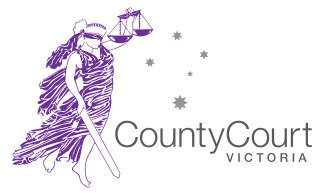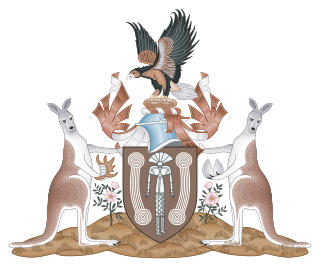Related Research Articles

The politics of Nauru take place in a framework of a parliamentary representative democratic republic, whereby the President of Nauru is the head of government of the executive branch. Legislative power is vested in both the government and the parliament. The Judiciary is independent of the executive and the legislature.

The High Court of Australia is Australia's apex court. It exercises original and appellate jurisdiction on matters specified in the Constitution of Australia and supplementary legislation.
John Jeremy Doyle,, Australian jurist, was the Chief Justice of the Supreme Court of South Australia, the highest ranking court in the Australian State of South Australia, between 1995 and 2012.

John Leslie Toohey, AC, QC was an Australian judge who was a Justice of the High Court of Australia from 1987 to 1998.

The County Court of Victoria is the intermediate court in the Australian state of Victoria. It is equivalent to district courts in the other states.
Sir William Edward Stanley Forster was the first Chief Justice of the Supreme Court of the Northern Territory holding that position from 1979 to 1985. Before that he was the first Chief Judge from 1977 to 1979 and Senior Judge from 1971 to 1977, all positions which were effectively the same.
Keith John Austin Asche is a former Administrator of the Northern Territory of Australia and was the third Chief Justice of the Supreme Court of the Northern Territory.
John Spence Winneke, was a judge of the Supreme Court of Victoria and President of the Court of Appeal of the Supreme Court of Victoria, which is the highest ranking court in the Australian state of Victoria.

The Local Court of the Northern Territory is one of two levels of court in the Northern Territory of Australia. It has jurisdiction in civil disputes up to A$250,000, and in criminal cases in the trial of summary offences, and also deals with preliminary matters for indictable offences which are then heard by the Supreme Court of the Northern Territory. There are local courts held in Darwin, Alice Springs, Katherine, Tennant Creek, and some "bush courts" in remote locations.
George Newhouse is an Australian human rights lawyer and a former local councillor. He is the principal solicitor of the National Justice Project, a human rights and social justice legal service, and currently an Adjunct Professor of Law at Macquarie University. and at the University of Technology Sydney.
Ian L. Gray AM is a retired Victorian lawyer, and former judge, chief magistrate and State Coroner at the Coroners Court of Victoria.
Mordecai "Mordy" Bromberg SC is an Australian judge who was appointed to the Federal Court of Australia in 2009. He was previously a senior barrister, and in his youth also played four seasons of Australian rules football for the St Kilda Football Club.
The Children's Court of Victoria is a statutory court created in Victoria, Australia. The court deals with criminal offences alleged to be committed by children aged between 10 and 17 and with proceedings concerning children under the age of 17 relating to the care and protection of children.

Sir Richard Arthur Blackburn, was an Australian judge, prominent legal academic and military officer. He became a judge of three courts in Australia, and eventually became chief justice of the Australian Capital Territory. In the 1970s he decided one of Australia's earliest Aboriginal Land rights cases. The annual Sir Richard Blackburn Memorial lectures in Canberra commemorate his service to the Australian legal community.

The ANU College of Law is the law school at the Australian National University and one of the seven academic Colleges of the ANU. It is located in Canberra, the capital of Australia. This provides the College with opportunities to connect with the work of the Parliament of Australia, the High Court of Australia, the departments and agencies of the Federal Government, as well as the local ACT law-making institutions – the Legislative Assembly and the ACT courts.
John Edward Reeves is a former Australian politician, lawyer and judge. He was a Labor member of the Australian House of Representatives from 1983 to 1984, a prominent barrister in Darwin afterwards, the author of the controversial 1999 Reeves Report on Aboriginal land rights in Australia. He served as a Judge of the Federal Court of Australia from November 2007 to January 2022.

The Supreme Court of Nauru was the highest court in the judicial system of the Republic of Nauru till the establishment of the Nauruan Court of Appeal in 2018.
In January 2014, Nauru's President Baron Waqa fired the country's only magistrate Peter Law, and cancelled the visa of its Chief Justice Geoffrey Eames. Law was fired after issuing an injunction to temporarily halt the deportation of three foreign nationals. Eames issued an injunction in an unsuccessful attempt to temporarily halt Law's deportation. Eames was in Australia at the time and his visa was cancelled, preventing his return to Nauru.
Mohammed Shafiullah Khan is a judge of the Supreme Court of Nauru, appointed in 2014.
References
- 1 2 3 4 Emerson, John (2006). History of the Independent Bar of South Australia. Papinian Publishing. ISBN 086396835X.
- 1 2 "The Honourable Geoffrey Michael Eames". Supreme Court. Retrieved 3 March 2019.
- 1 2 "Nauru Chief Justice, Australian Geoffrey Eames, resigns". ABC News. 13 March 2014. Retrieved 30 April 2017.
- ↑ "Past judges and associate judges". Supreme Court of Victoria. Archived from the original on 26 February 2015. Retrieved 30 April 2017.
- ↑ "Geoffrey M (The Hon) Eames QC". Meldrum & Hyland list. Archived from the original on 7 October 2013.
- ↑ "Nauru expels Australian magistrate Peter Law, bars chief justice Geoffrey Eames from returning to country". ABC News. 20 January 2014. Retrieved 3 March 2019.
- ↑ "Nauru opposition MPs still in limbo over suspensions". Radio New Zealand. 24 July 2014. Retrieved 3 March 2019.